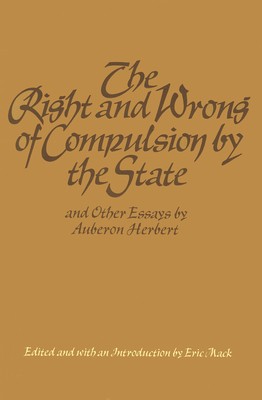
- We will send in 10–14 business days.
- Author: Auberon Herbert
- Publisher: Liberty Fund
- ISBN-10: 091396641X
- ISBN-13: 9780913966419
- Format: 15.8 x 23.4 x 3.1 cm, kieti viršeliai
- Language: English
- SAVE -10% with code: EXTRA
The Right and Wrong of Compulsion by the State, and Other Essays (e-book) (used book) | bookbook.eu
Reviews
Description
Auberon Herbert (1838-1906) is an eloquent, forceful, and uncompromising defender of liberty--indeed, in the judgment of Richard M. Ebeling he is "one of the most important and articulate advocates of liberty in the last two hundred years." Herbert was a major participant in the profound and wide-ranging intellectual ferment of the late Victorian age. He formulated a system of "thorough" individualism that he described as "voluntaryism." To Herbert, "you will not make people wiser and better by taking liberty of action from them. A man can learn only when he is free to act." As Eric Mack writes, "Carrying natural rights theory to its logical limits, Herbert demanded complete social and economic freedom for all noncoercive individuals and the radical restriction of the use of force to the role of protecting those freedoms--including the freedom of peaceful persons to withhold support from any or all state activities." There are ten essays.
EXTRA 10 % discount with code: EXTRA
The promotion ends in 23d.02:29:21
The discount code is valid when purchasing from 10 €. Discounts do not stack.
- Author: Auberon Herbert
- Publisher: Liberty Fund
- ISBN-10: 091396641X
- ISBN-13: 9780913966419
- Format: 15.8 x 23.4 x 3.1 cm, kieti viršeliai
- Language: English English
Auberon Herbert (1838-1906) is an eloquent, forceful, and uncompromising defender of liberty--indeed, in the judgment of Richard M. Ebeling he is "one of the most important and articulate advocates of liberty in the last two hundred years." Herbert was a major participant in the profound and wide-ranging intellectual ferment of the late Victorian age. He formulated a system of "thorough" individualism that he described as "voluntaryism." To Herbert, "you will not make people wiser and better by taking liberty of action from them. A man can learn only when he is free to act." As Eric Mack writes, "Carrying natural rights theory to its logical limits, Herbert demanded complete social and economic freedom for all noncoercive individuals and the radical restriction of the use of force to the role of protecting those freedoms--including the freedom of peaceful persons to withhold support from any or all state activities." There are ten essays.


Reviews